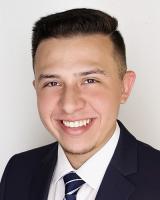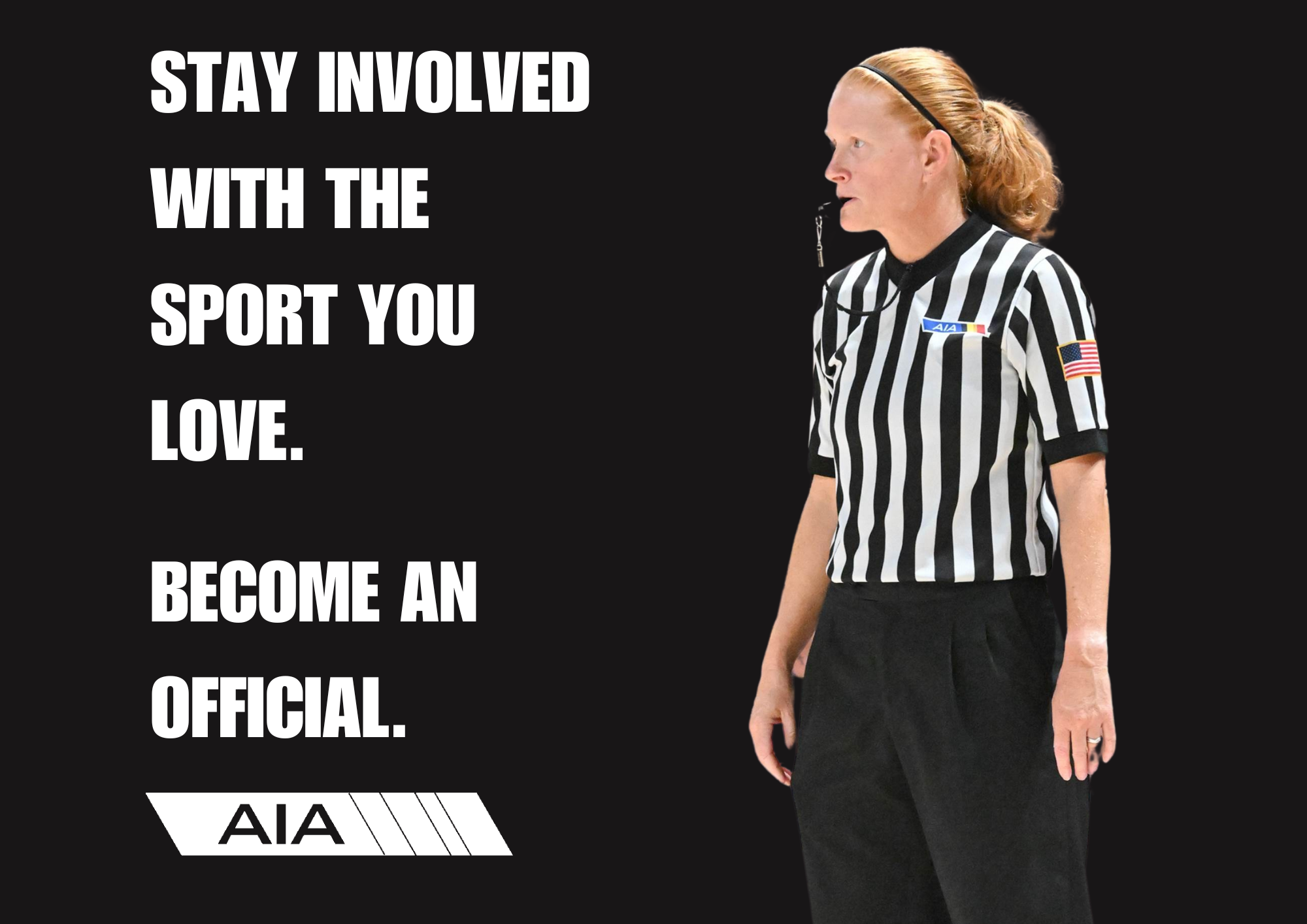Rare disease shapes Russo siblings’ future
November 22, 2025 by Juan Manosalva, Arizona State University
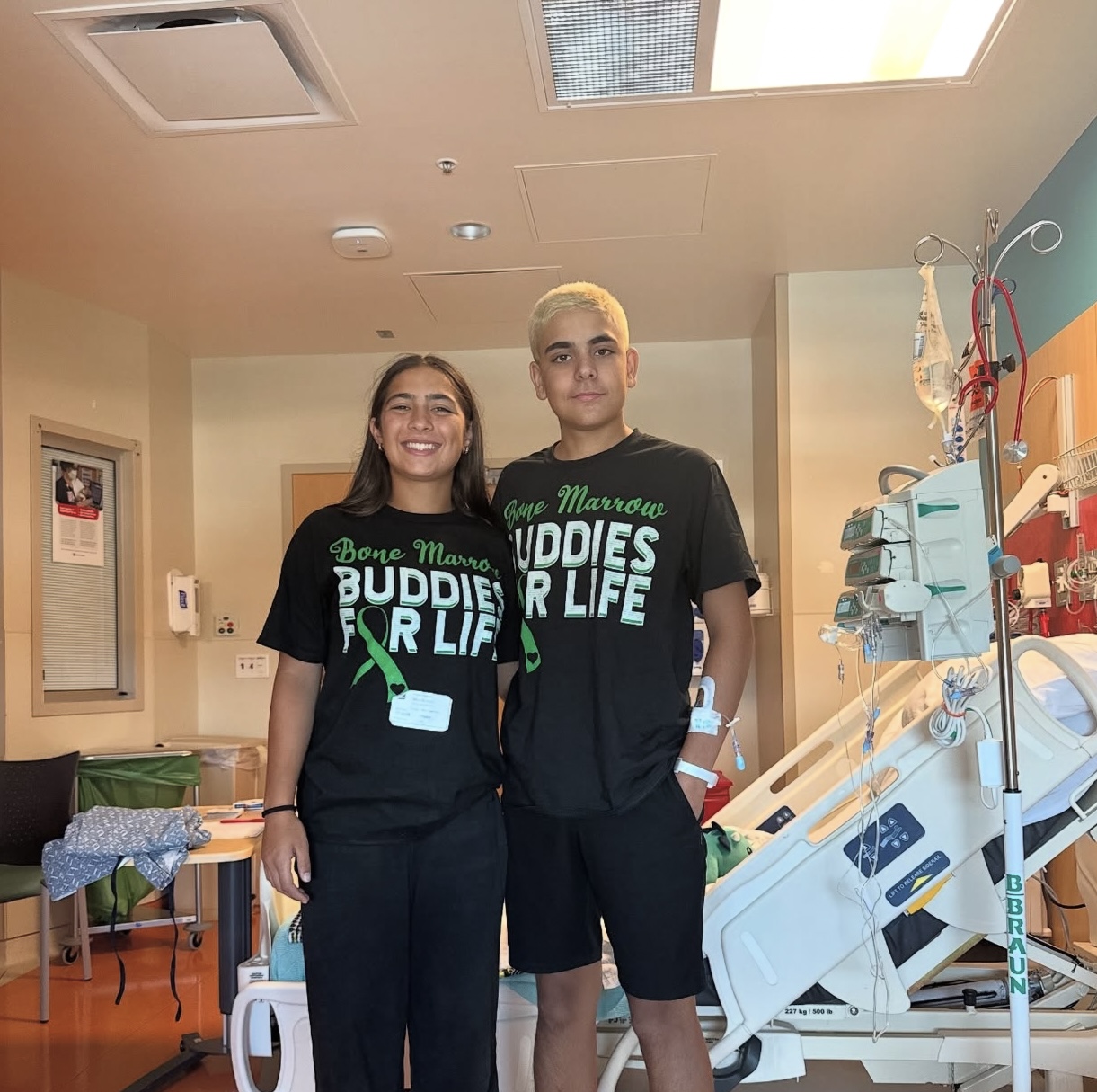
Juan Manosalva is an ASU Cronkite School of Journalism student assigned to cover Gilbert Christian High School for AZPreps365.com
PHOENIX — When doctors told the Russo family that 19-year-old JP would need a second bone marrow transplant, his younger sister didn’t hesitate.
“I just said, 'OK. When do you need me?'” said Mila Russo, a junior multi-sport athlete at Gilbert Christian High School. “If it helps him feel normal again, I’ll do it.”
Four months after donating her stem cells to her brother, Mila will do it again — a booster infusion after tests showed JP’s first transplant hadn’t fully taken.
Although it may seem arduous for the Ahwatukee family, it’s just another chapter in a 10-year medical journey that has shaped both siblings’ lives in ways they never imagined.
JP, currently studying online at Grand Canyon University to become a nurse practitioner, was 8 when doctors first noticed something wasn’t right. Severe abdominal pain and fevers kept him out of school for weeks.
“He’d go to the bathroom 15 to 20 times a day,” said his father, Joe Russo. “Every doctor looked at one piece of the puzzle, but nobody saw the whole kid.”
For years, specialists called it ulcerative colitis, and that’s why the treatments never worked.
“Steroids, injections, diets — you name it,” said his mother, Zaundra Russo. “We lived at the hospital for a decade, and nothing was really working.”
After nearly 10 years of misdiagnoses, a visiting Maltese immunologist, Dr. Keith Sacco, ordered a genetic test at Phoenix Children’s Hospital. The results revealed JP has a CARD11 gene mutation, an immune disorder so rare that there are only three documented cases worldwide.
“It was a shock but also a relief,” Zaundra said. “Finally, someone could tell us why our son had been in pain for 10 years.”
The discovery explained everything — the joint pain, bone inflammation, fatigue and endless hospital visits. But soon after, Dr. Sacco returned to Malta, leaving the family without an expert on the newly discovered disease.
“When they told me he had to return to Malta, I remember crying to Dr. Holly Miller, who was taking the case,” Zaundra said. “She told me, ‘Zaundra, there’s no expert on what JP has, but I promise you I’ll become the expert you’re looking for.’ That made me trust her immediately.”
After many failed treatments, doctors confirmed the only possible cure was a bone marrow transplant.
JP was placed on the national donor registry, but after months without hearing back, doctors suggested that his younger sister could be tested for compatibility.
Without hesitation Mila agreed, and it turned out they were a half-match, which was enough to proceed with the transplant.
“She wasn’t a perfect match, only a half,” Joe said. “But she didn’t even hesitate. She said she would donate her bone marrow to restore her brother’s and save his life. That’s just who she is.”
For five days, Mila gave herself injections to stimulate stem cell production.
“I had to inject myself in the stomach,” she said. “It wasn’t fun. I was scared, but I knew why I was doing it.”
After two long days connected to a machine that filtered her blood, doctors collected enough cells for JP’s transplant, but her life couldn’t stop. The next morning, Mila boarded a plane to California for a soccer tournament.
“She was pale, tired, but she went,” Zaundra said. “I told her to stay home and rest, but she said, ‘No, my team needs me.' ”
The transplant took place on July 17. In a small room at Phoenix Children’s Hospital, the family watched a clear bag of Mila’s stem cells drip into JP’s chest port.
“It’s strange,” JP said. “You think there’ll be fireworks, but it’s just a bag. I called it my rebirthday.”
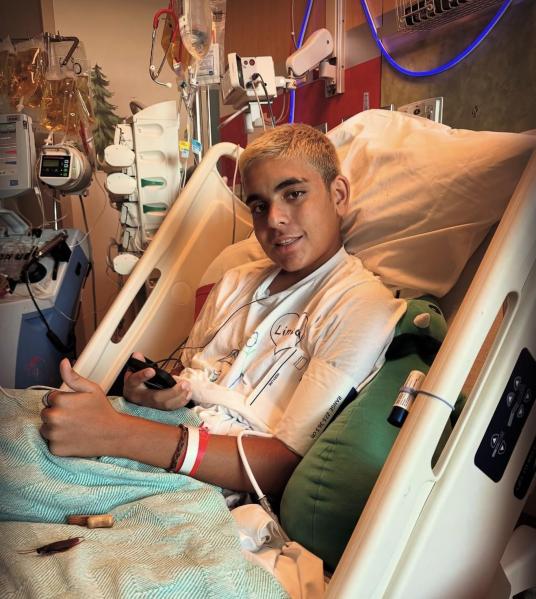 JP Russo rests in his hospital bed before his bone marrow transplant at Phoenix Children’s Hospital. (Photo courtesy of Russo family)
JP Russo rests in his hospital bed before his bone marrow transplant at Phoenix Children’s Hospital. (Photo courtesy of Russo family)
At just 17, Mila has spent her high school years balancing two identities: a standout soccer player chasing a college scholarship and a sister whose body keeps her brother alive.
Mila has been an athlete almost her whole life. She started playing soccer when she was three and has competed in multiple sports at Gilbert Christian, including basketball, cross country, where she won a state championship and, of course, soccer, where she helped lead her team to another state title. But her main focus is her ECNL team, Pateadores, from Southern California, where she travels every weekend to compete.
“To be able to do that, you have to be a pretty high-impact player,” said Lindsey Huie, Pateadores head coach. “She’s a great leader, the kind of player who self-sacrifices and can play any position the team needs to do well. So it didn’t surprise me when she made the decision to be JP’s donor. She’s definitely more than just a great soccer player.”
Huie said Mila has started every game since she began coaching the team a year and a half ago.
“She’s an indispensable player, one of the most important on the team,” Huie said.
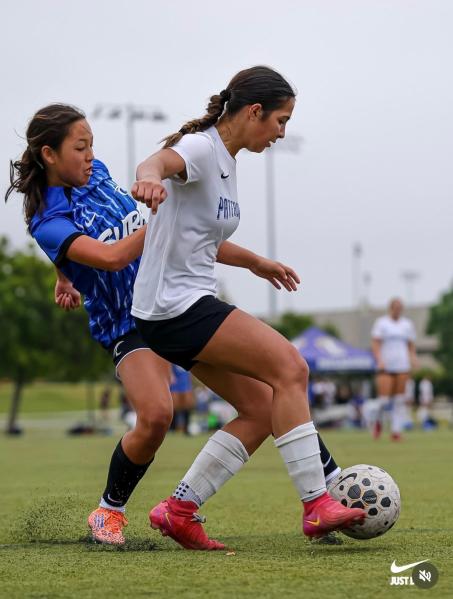
Mila’s routine is relentless. She travels every weekend to play with her team, and on weekdays she trains early in the morning before school, attends classes, goes to practice, and then visits the hospital to sit by JP’s side.
“She’s one of the hardest-working kids I’ve ever seen,” Joe said. “She trains at 4:30 a.m., drives to school for almost 30 minutes, then to practice, and still finds time to be at the hospital.”
“Some days, I went straight from practice to the hospital,” Mila said. “Even if I’m tired, I just want to be there with him.”
Mila has lived in hospitals for as long as she can remember. As a child, she’d line up her brother’s pill bottles and pretend to be the nurse.
“She’s been helping him since she was little,” Zaundra said. “This is just a bigger version of that.”
Even outside the hospital, her brother’s illness shapes every decision. She’s skipped practices and games during flu season to avoid carrying germs home. She’s missed birthday parties, sleepovers, trips, and all the moments most teenagers take for granted.
“It’s not that I feel forced,” Mila said. “I just know what could happen if JP gets sick, and that’s more important.”
When JP was hospitalized after the transplant, she sat beside him every day.
“I’d help Mom wipe things down, bring him water, whatever he needed,” Mila said. “Sometimes we didn’t even talk, but just being there felt right.”
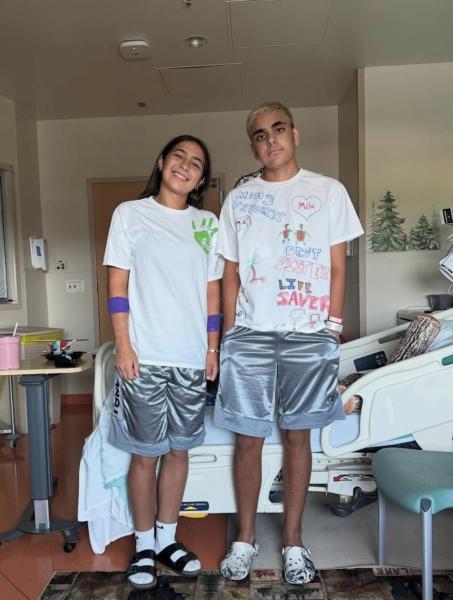 After JP’s bone marrow transplant, Mila Russo brings support and encouragement during a visit to JP's hospital room. (Photo courtesy of Russo family)
After JP’s bone marrow transplant, Mila Russo brings support and encouragement during a visit to JP's hospital room. (Photo courtesy of Russo family)
The transplant worked for a while. JP’s condition improved, and his family dared to hope the ordeal was over. But on Oct. 20, just three months after the procedure, doctors found that not enough of Mila’s cells had taken hold. A second donation became necessary.
“We had to go through it all over again, the injections, the collection, the fear,” Zaundra said. “It’s heartbreaking.”
For Mila, the news came during one of the most important years of her athletic career. College recruiters are watching. Showcases and tournaments matter, and she hoped to commit to a university before the end of the year.
“That’s a big deal in the world of recruiting,” Huie said. “You only have a set number of showcases, and if one of those is compromised because you’re not physically well, that can take a huge hit on your recruiting.”
Yet she’ll pause everything again to help her brother, even if it risks her athletic performance.
“I know this is an important year,” Mila said. “But JP’s health comes first. There’ll always be soccer and opportunities, but there might not always be another chance for him.”
Joe calls his daughter “a beast” and admires her quiet resolve.
“You don’t want your kid to have to face life-and-death things in high school,” he said. “But she’s mature beyond her years. She never complains, not once.”
Mila’s dream is to play college soccer while studying sports medicine. Her brother’s dream is simpler: to live pain-free and be a normal kid.
Those dreams now depend on the same thing: the second transplant.
JP’s optimism steadies the family. Even through pain, steroids and isolation, he keeps smiling.
“I’ve been sick most of my life,” he said. “I think God prepared me for this. I told my parents I couldn’t wait anymore. I want to do it and start living.”
For JP, Mila’s decision means more than another medical procedure. It means a chance at normalcy, the thing he’s wanted most since all of this began.
“She’s my best friend and now also my hero,” JP said. “She makes everyone smile, even when I’m sick.”
Mila admits the process scares her, not because of pain, but because of what it represents.
“It’s hard to think my blood is what keeps him alive,” Mila said. “Sometimes I wonder what my life would be like if things were normal. But then I look at him, and I know I wouldn’t change anything.”
The Russos have learned to live one day at a time. Joe balances work trips as a freelance event producer with being present for his family.
“If I don’t work, I don’t get paid,” he said. “But when you’re gone, you miss a lot, and those moments never come back.”
The Russos have found in their faith the strength to carry them through it all.
“Faith keeps us going,” Joe said. “We can’t control the outcome. We just trust there’s a reason.”
If the booster works, doctors believe JP’s immune system will stabilize. He could start college in person next fall and maybe even watch his sister play for the first time in years.
“All I want is for him to have one normal summer,” Joe said. “No hospitals, just being a kid again.”
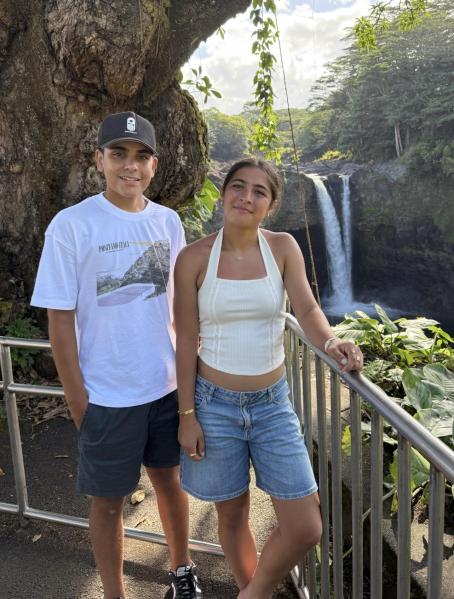 Siblings Mila and JP Russo pose at Rainbow Falls in Hilo, Hawaii, during a brief family vacation ahead of JP’s transplant. (Photo courtesy of Russo family)
Siblings Mila and JP Russo pose at Rainbow Falls in Hilo, Hawaii, during a brief family vacation ahead of JP’s transplant. (Photo courtesy of Russo family)
Inside the Russos’ home, a whiteboard lists JP’s medications next to Mila’s soccer schedule. Her cleats rest by the door. His hospital bag sits beside them. A portrait of a family whose lives beat in the same rhythm.
“Mila’s our marrow,” Zaundra said. “She keeps us strong in every way. She’s the strength that keeps us together.”
For now, Mila continues training, studying and preparing for another donation. Her body fuels both her athletic dreams and her brother’s survival.
“People tell me I’m brave,” Mila said. “But I’m just doing what anyone would do for their family.”
The Russos know life won’t return to what it was before JP got sick. But they also know that, in their family, hope and faith run deep, and in the end, it all runs in Mila’s blood.
“She gave me life once,” JP said smiling. “Now she’s giving me another.”
Mila still dreams of playing college soccer and studying sports medicine. But for now, her focus is on JP’s next procedure. She has already started the Neupogen shots, and everything she has fought for comes down to Nov. 26, when JP will begin receiving his new life.
“I want him to wake up one day and not think about being sick,” she said. “That’s what I’m fighting for.”
